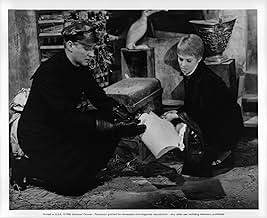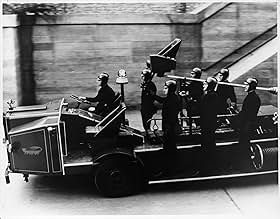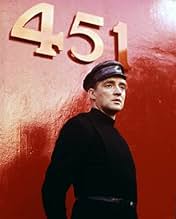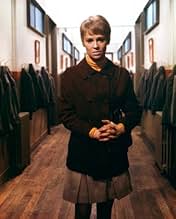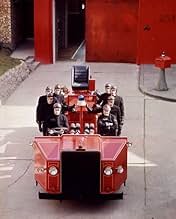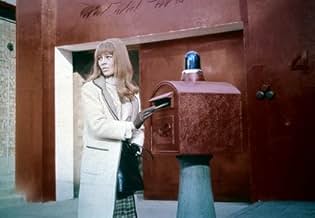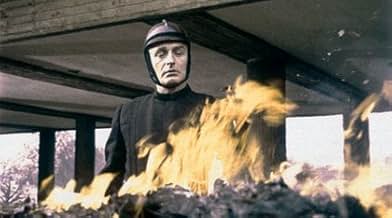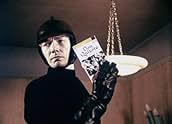Fahrenheit 451
- 1966
- Tous publics
- 1h 52min
NOTE IMDb
7,2/10
46 k
MA NOTE
Dans un avenir oppressif, un pompier dont le travail consiste à détruire tous les livres se met à s'interroger sur sa tâche.Dans un avenir oppressif, un pompier dont le travail consiste à détruire tous les livres se met à s'interroger sur sa tâche.Dans un avenir oppressif, un pompier dont le travail consiste à détruire tous les livres se met à s'interroger sur sa tâche.
- Nomination aux 1 BAFTA Award
- 4 nominations au total
Gillian Aldam
- Judoka Woman
- (non crédité)
Alfie Bass
- Book Person: 'The Prince'
- (non crédité)
Yvonne Blake
- Book Person: 'The Jewish Question'
- (non crédité)
Arthur Cox
- Male Nurse
- (non crédité)
Frank Cox
- Book Person: 'Prejudice'
- (non crédité)
Fred Cox
- Book Person: 'Pride'
- (non crédité)
Noel Davis
- Cousin Midge - TV Personality
- (non crédité)
Judith Drinan
- Book Person - Plato's 'Republic'
- (non crédité)
Kevin Eldon
- Robert - First Schoolboy
- (non crédité)
Histoire
Le saviez-vous
- AnecdotesAccording to producer Lewis M. Allen, François Truffaut and Oskar Werner hated each other by the end of filming. For the last two weeks, they didn't speak to one another.
- GaffesAfter Montag comes out of the first raid to burn the books, the placement of the fire protective clothing (helmet and gloves) are unnatural movements and appear to be a reverse run of film footage. This is further compounded by the fact that he walks backwards to get the flamethrower which has flame entering the nozzle instead of leaving the nozzle.
- Citations
Guy Montag: To learn how to find, one must first learn how to hide.
- Crédits fousThe beginning credits are spoken instead of written on the screen.
- Versions alternativesOriginally Noel Davis (who plays Cousin Midge) did the opening voice over. In the current version it is done by Alex Scott ("The Life of Henry Brulard" Book Person).
- ConnexionsFeatured in Night Gallery: The Different Ones/Tell David.../Logoda's Heads (1971)
Commentaire à la une
Go figure that I had the privilege of seeing "Fahrenheit 451," for free, on a big screen a few years back (an independent Illinois art house had gotten hold of what was allegedly one of the last surviving prints), and at the time hadn't the foggiest concept of how PRIVILEGED an event it was. Sitting in a theater crowded with college students on a budget with nothing better to do, I watched this diverting little retro item, appreciated its subtlety, nuance, bold visual style, and 'got' the message that if we're not careful, we'll be mindless drones having our desires dictated by The Tube (in current times, that's hardly a profound statement).
Francois Truffaut's adaptation of Ray Bradbury's novel is a bold visual feast that presents a time that might seem 'retrograde' in the eye of a modern pop-culture snob, but ultimately projects what a conceivable 'future' might look like (and not that CGI malarkey served up in "The Matrix"). Interiors of houses are awash in odd colors and give shelter to appliances that don't look dissimilar from our own; TV screens embedded in living-room walls play programs which vacuous housewives interact with sometimes. The film is so relentlessly confident in its appearance that it withstands the test of time.
Though if "Fahrenheit 451" only had its storybook style to rely on, it would fade and be filed away as a mere technical achievement. Truffaut, working from strong source material, concocts a riveting parable about ignorance and the things we, as humans, take for granted. The story follows Guy Montag, an Everyman who is employed as a fireman--a connotation which entails ransacking residences in search of books (reading and writing have been outlawed in this world) and burning them. He has a medicated-smile wife (Julie Christie), a quiet home life, and is in line for a promotion, until a neighbor (Christie again) inspires him to question his motives for working such a sordid job.
One character argues that books cause depression, making people confront unpleasant feelings. "Fahrenheit 451" sometimes runs the risk of lending truth to that statement--in some ways, it is a bleak commentary on civilization, but at the same time grounded in a benevolent humanity that offsets Orwell's brutal, pessimistic world of "1984" (though both texts and films share similar themes). This humanity is underlined in an upbeat, even comic ending (the details of which I won't divulge here).
"Fahrenheit 451" is a spellbinding work of art, in good company with other incendiary works ("A Clockwork Orange" and "Fight Club" come to mind) that have defied the constraints of time and age.
Francois Truffaut's adaptation of Ray Bradbury's novel is a bold visual feast that presents a time that might seem 'retrograde' in the eye of a modern pop-culture snob, but ultimately projects what a conceivable 'future' might look like (and not that CGI malarkey served up in "The Matrix"). Interiors of houses are awash in odd colors and give shelter to appliances that don't look dissimilar from our own; TV screens embedded in living-room walls play programs which vacuous housewives interact with sometimes. The film is so relentlessly confident in its appearance that it withstands the test of time.
Though if "Fahrenheit 451" only had its storybook style to rely on, it would fade and be filed away as a mere technical achievement. Truffaut, working from strong source material, concocts a riveting parable about ignorance and the things we, as humans, take for granted. The story follows Guy Montag, an Everyman who is employed as a fireman--a connotation which entails ransacking residences in search of books (reading and writing have been outlawed in this world) and burning them. He has a medicated-smile wife (Julie Christie), a quiet home life, and is in line for a promotion, until a neighbor (Christie again) inspires him to question his motives for working such a sordid job.
One character argues that books cause depression, making people confront unpleasant feelings. "Fahrenheit 451" sometimes runs the risk of lending truth to that statement--in some ways, it is a bleak commentary on civilization, but at the same time grounded in a benevolent humanity that offsets Orwell's brutal, pessimistic world of "1984" (though both texts and films share similar themes). This humanity is underlined in an upbeat, even comic ending (the details of which I won't divulge here).
"Fahrenheit 451" is a spellbinding work of art, in good company with other incendiary works ("A Clockwork Orange" and "Fight Club" come to mind) that have defied the constraints of time and age.
- Jonny_Numb
- 5 janv. 2005
- Permalien
Meilleurs choix
Connectez-vous pour évaluer et suivre la liste de favoris afin de recevoir des recommandations personnalisées
- How long is Fahrenheit 451?Alimenté par Alexa
Détails
- Date de sortie
- Pays d’origine
- Site officiel
- Langues
- Aussi connu sous le nom de
- Farenhajt 451
- Lieux de tournage
- Châteauneuf-sur-Loire, Loiret, France(Monorail)
- Sociétés de production
- Voir plus de crédits d'entreprise sur IMDbPro
Box-office
- Budget
- 1 500 000 $US (estimé)
- Montant brut aux États-Unis et au Canada
- 509 $US
- Week-end de sortie aux États-Unis et au Canada
- 11 206 $US
- 25 avr. 1999
- Montant brut mondial
- 581 $US
- Durée1 heure 52 minutes
- Rapport de forme
- 1.66 : 1
Contribuer à cette page
Suggérer une modification ou ajouter du contenu manquant

Lacune principale
By what name was Fahrenheit 451 (1966) officially released in India in English?
Répondre

